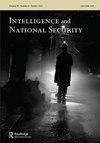政治与情报分析:加拿大的经验
IF 0.8
3区 社会学
Q1 HISTORY
引用次数: 0
摘要
关于政治和智力之间相互作用的学术辩论主要由美国的经验主导。我们的研究基于对加拿大情报和国家安全界60多人(包括政治工作人员)的采访,提供了一个新的案例研究:加拿大是一个通过“五眼”伙伴关系获得大量情报的中间大国。我们发现,在加拿大,几乎不存在将情报分析硬政治化的情况。解释这一发现的最重要因素是加拿大在世界上的结构地位,或者其地理位置如何塑造情报与政治之间更广泛的互动背景。除此之外,国内层面的六个更具体的因素也很重要:外交和安全政策作为政治问题相对不重要,机会很少,缺乏政治利益,决策者普遍智力低下,国家安全决策透明度低,以及公务员队伍中的无党派传统。该文件最后反思了这一评估:尽管硬政治化在加拿大仍然很少见,但阻止政治化出现的盾牌在未来可能会受到越来越多的考验。本文章由计算机程序翻译,如有差异,请以英文原文为准。
Politics and intelligence analysis: the Canadian experience
ABSTRACT Academic debate on the interplay between politics and intelligence is dominated by the U.S. experience. Our research, based on interviews with over sixty individuals in the Canadian intelligence and national security community and including political staffers, provides a new case study: that of Canada, a middle power with considerable access to intelligence through the Five Eyes partnership. We found that cases of hard politicization of intelligence analysis are virtually non-existent in Canada. The most important factor explaining this finding is Canada’s structural position in the world, or how its geography shapes the broader context of interactions between intelligence and politics. Beyond this, six more specific factors at the domestic level also matter: the relative unimportance of foreign and security policy as political issues, few opportunities, a lack of political benefits, low intelligence literacy generally among policy makers, poor transparency in national security decision making, and a tradition of non-partisanship in the civil service. The paper concludes by reflecting on this assessment: while hard politicization remains a rarity in Canada, the shields that have prevented the emergence of politicization will likely be increasingly tested in the future.
求助全文
通过发布文献求助,成功后即可免费获取论文全文。
去求助
来源期刊

Intelligence and National Security
Multiple-
CiteScore
1.80
自引率
41.70%
发文量
93
期刊介绍:
Intelligence has never played a more prominent role in international politics than it does now in the early years of the twenty-first century. National intelligence services are larger than ever, and they are more transparent in their activities in the policy making of democratic nations. Intelligence and National Security is widely regarded as the world''s leading scholarly journal focused on the role of intelligence and secretive agencies in international relations. It examines this aspect of national security from a variety of perspectives and academic disciplines, with insightful articles research and written by leading experts based around the globe. Among the topics covered in the journal are: • the historical development of intelligence agencies • representations of intelligence in popular culture • public understandings and expectations related to intelligence • intelligence and ethics • intelligence collection and analysis • covert action and counterintelligence • privacy and intelligence accountability • the outsourcing of intelligence operations • the role of politics in intelligence activities • international intelligence cooperation and burden-sharing • the relationships among intelligence agencies, military organizations, and civilian policy departments. Authors for Intelligence and National Security come from a range of disciplines, including international affairs, history, sociology, political science, law, anthropology, philosophy, medicine, statistics, psychology, bio-sciences, and mathematics. These perspectives are regularly augmented by research submitted from current and former intelligence practitioners in several different nations. Each issue features a rich menu of articles about the uses (and occasional misuses) of intelligence, supplemented from time to time with special forums on current intelligence issues and interviews with leading intelligence officials.
 求助内容:
求助内容: 应助结果提醒方式:
应助结果提醒方式:


